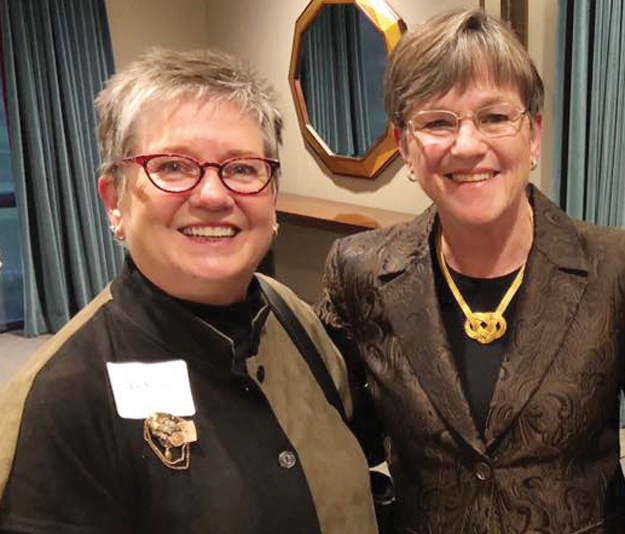
A Chronicle reader posed a two-part question to outgoing Kansas State Rep. Joy Koesten, a member of The Temple, Congregation B’nai Jehudah: Will there be any Jewish representatives or senators in the Kansas Legislature this session and, if not, is that a concern that we are not represented?
Koesten does not believe there will be any Jewish representatives or senators in the Kansas Legislature in 2019. In addition, she said she was unaware of any Muslim or Sheik reps or reps of any religion other than Christianity.
That lack of diversity shows up in a variety of ways, she said. One example is the faith-based adoption bill that was signed into law in 2018. The law, according to the Wichita Eagle, “allows agencies to refuse placement of children ‘for foster care or adoption when the proposed placement of such child would violate such agency’s sincerely held religious beliefs.’ ”
Koesten voted against it and voiced her concerns during debate on the House floor.
“I said, ‘You don’t get it. This bill doesn’t just discriminate against gay couples. It will discriminate against Muslim couples, against Jewish couples, against any couple that doesn’t sign off that they accept Christianity,’ ” she explained.
Even as she believes her stand on this bill eventually contributed to her defeat (there is a large Catholic parish in her district), she said there were “real dangers when a governing body doesn’t at least attend to the variety of faiths that form our community.”
She believes it is important to have Jewish representation in the legislature as well as representatives from other religions.
“I (also) think we need to have leadership who is at least attentive to different faith points of view. And that certainly doesn’t happen.”
But, she thinks Gov.-elect Laura Kelly will be more attuned to that than either of the state’s two previous governors — Gov. Brownback and Gov. Colyer.
“I think Laura Kelly will bring a different tenor to those proceedings,” Koesten said. “The Interfaith Action Alliance is certainly on her radar. I think she will be much more a champion of inclusiveness of all faiths.”
She thinks that inclusiveness is not just important because she’s Jewish, but because her district, and the area the Blue Valley School District encompasses, is very diverse.
“I have four synagogues in and around my district and a large Muslim community,” she said. “I have large minority populations in my schools. There are 40 nations represented in one school alone. Sixty-five languages are spoken in Blue Valley School District. These kids’ parents come from all over the world to work at Garmin and Sprint and all of our big companies, and they expect high-quality schools and inclusive neighborhoods. It’s different than most other communities in our state.”
Koesten hopes the legislature will be a lot more open to different faith points of view in the coming years. She also noted it’s a challenge “being the only Jew in the place.”
“A lot of people have just never met anybody who isn’t exactly like them, who don’t have the same religious framework,” she said. “I didn’t expose it a lot unless it was in a context where it needed to be exposed.”
There were times in her two years as a state representative that Koesten was uncomfortable with the legislature’s embrace of Christianity.
“The thing that is most disturbing to me is every single day in the House we start with a prayer,” she explained. “The prayer always ended ‘in Jesus’ name we pray.’ ”
The prayers were most often presented by the legislature’s chaplain.
“I loved her prayers,” Koesten said. “They were incredibly well thought out. They were timely. They were humorous. They were compelling. They were really good and then she would end them ‘in Jesus Christ’s name we pray.’ ”
So Koesten decided to discuss her thoughts with the chaplain.
“I told her how much I appreciated her thoughts … and then I said, ‘You end it in Jesus Christ’s name we pray, and I can’t say amen and I feel so excluded at that point. Is there any way that you could just alter your closing so that everybody in the chamber can feel a part of your thoughts?’ ”
The chaplain did change things for a while, Koesten said, and she gives the chaplain a lot of credit for those actions.
“(But) we had visiting clergy on occasion who came and gave terribly inappropriate prayers,” Koesten said. “They are not supposed to. But there is just this tacit acquiescence, and there is a pretty strong group of people, who are now in leadership, who will push that far-right Christian agenda as much as they can. I think for me that was incredibly uncomfortable.”


